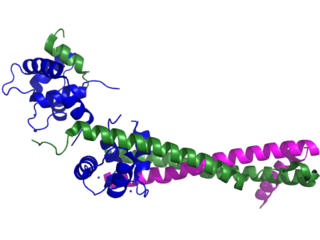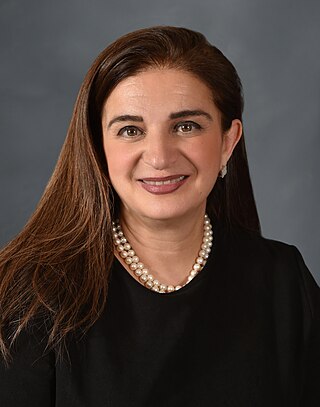
The University of Vermont (UVM),officially titled as University of Vermont and State Agricultural College,is a public land-grant research university in Burlington,Vermont. Founded in 1791,the university is the oldest in Vermont and the fifth-oldest in New England,making it among the oldest in the United States. It is one of the original eight Public Ivies.

Cardiovascular disease (CVD) is any disease involving the heart or blood vessels. CVDs constitute a class of diseases that includes:coronary artery diseases,heart failure,hypertensive heart disease,rheumatic heart disease,cardiomyopathy,arrhythmia,congenital heart disease,valvular heart disease,carditis,aortic aneurysms,peripheral artery disease,thromboembolic disease,and venous thrombosis.

The University of Vermont Medical Center (UVMMC) is a five-campus academic medical facility under the corporate umbrella of the University of Vermont Health Network that is anchored by a 562-bed hospital in Burlington,Vermont. UVMMC is based in Burlington and serves as both a regional referral center and a community hospital. The hospital was formerly known as the Medical Center Hospital of Vermont and later as Fletcher Allen Health Care until getting its current name. It is affiliated with the University of Vermont's Robert Larner College of Medicine and its College of Nursing and Health Sciences.
The lipid hypothesis is a medical theory postulating a link between blood cholesterol levels and the occurrence of cardiovascular disease. A summary from 1976 described it as:"measures used to lower the plasma lipids in patients with hyperlipidemia will lead to reductions in new events of coronary heart disease". It states,more concisely,that "decreasing blood cholesterol [...] significantly reduces coronary heart disease".

Troponin I is a cardiac and skeletal muscle protein family. It is a part of the troponin protein complex,where it binds to actin in thin myofilaments to hold the actin-tropomyosin complex in place. Troponin I prevents myosin from binding to actin in relaxed muscle. When calcium binds to the troponin C,it causes conformational changes which lead to dislocation of troponin I. Afterwards,tropomyosin leaves the binding site for myosin on actin leading to contraction of muscle. The letter I is given due to its inhibitory character. It is a useful marker in the laboratory diagnosis of heart attack. It occurs in different plasma concentration but the same circumstances as troponin T - either test can be performed for confirmation of cardiac muscle damage and laboratories usually offer one test or the other.

The European Society of Cardiology (ESC) is an independent non-profit,non-governmental professional association that works to advance the prevention,diagnosis and management of diseases of the heart and blood vessels,and improve scientific understanding of the heart and vascular system. This is done by:
The Robert Larner College of Medicine is the medical school of the University of Vermont,a public research university in Burlington,Vermont. Established in 1822,it is the nation's seventh oldest medical school. The primary teaching hospital for the Larner College of Medicine is the UVM Medical Center in Burlington.
Keiji Fukuda is a Japanese-American physician and epidemiologist,specializing in influenza epidemiology. He was an Assistant Director-General of the World Health Organization (WHO) from 2009 to 2016,and the Director of the School of Public Health at the University of Hong Kong (HKU) between 2017 and 2021.

JoAnn Elisabeth Manson is an American physician and professor known for her pioneering research,public leadership,and advocacy in the fields of epidemiology and women's health.
Professor Peter Sleight M.D.(Cantab.),D.M. (Oxon.) FRCP FACC was a distinguished and internationally renowned research cardiologist and an Honorary Consultant Physician at the John Radcliffe Hospital in Oxford and the Oxford University Hospitals NHS Foundation Trust. Sleight was Emeritus Field Marshal Alexander Professor of Cardiovascular Medicine at the University of Oxford and an Emeritus Fellow of Exeter College,Oxford.
Karen A. Matthews is an American health psychologist known for her research on the epidemiology and risk factors associated with cardiovascular disease,early signs of coronary heart disease risk in children,women's health and menopause,and connections between socioeconomic status and health. She is Professor Emerita of Psychiatry at the University of Pittsburgh.
Sekar Kathiresan is chief executive officer and co-founder of Verve Therapeutics. Verve is pioneering a new approach to the care of cardiovascular disease by developing single-course gene-editing therapies that safely and durably lower plasma LDL cholesterol in order to treat atherosclerotic cardiovascular disease.

Harriet Pearson Dustan (1920–1999) was an American physician who is known for her pioneering contributions to effective detection and treatment of hypertension. She was the first woman to serve on the Board of Governors of the American Board of Internal Medicine.

Mary Cushman is an American vascular hematologist. She is a Full professor of Medicine and Pathology in the Robert Larner College of Medicine at the University of Vermont.
Rory Waterman is an American chemist. He is a full professor and associate dean of inorganic,organometallic,and catalysis at the University of Vermont.
Cardiovascular disease in women is an integral area of research in the ongoing studies of women's health. Cardiovascular disease (CVD) is an umbrella term for a wide range of diseases affecting the heart and blood vessels,including but not limited to,coronary artery disease,stroke,cardiomyopathy,myocardial infarctions,and aortic aneurysms.
The Strong Heart Study is an ongoing cohort study of cardiovascular disease (CVD) and its risk factors among American Indian men and women. The original cohort began in 1984 with 4,549 participants ages 35–74 from 13 tribal nations and communities in Arizona,Oklahoma,North Dakota,and South Dakota. The need for specific ethnic and cultural understanding and sensitivities was recognized from the onset,so the study has a community-based participatory research (CBPR) model. Community members were involved in all stages of conception,design,and implementation of the research. Now in its seventh phase,the extensive research has led to many important findings about heart disease and unique risk factors in native populations. It is a project funded by the National Heart,Lung,and Blood Institute (NHLBI). The study maintains field centers in Oklahoma,North and South Dakota,and Arizona and a coordinating center at the University of Oklahoma Health Sciences Center.
Michelle Asha Albert is an American physician who is the Walter A. Haas Lucie-Stern Endowed Chair in Cardiology and professor of medicine at the University of California,San Francisco. Albert is director of the UCSF Center for the Study of Adversity and Cardiovascular Disease. She is president of the American Heart Association. She served as the president of the Association of Black Cardiologists in 2020–2022 and as president of the Association of University Cardiologists (2021–2022). Albert is an elected member of the National Academy of Medicine,the American Society of Clinical Investigators and the Association of American Physicians.

Roxana Mehran is an Iranian-American cardiologist and Mount Sinai Endowed Professor of Medicine at the Icahn School of Medicine at Mount Sinai. She is known for her work in interventional cardiology.

Rodney Thornton Jackson is a New Zealand medically trained epidemiologist who has had lead roles in publicly funded research focussing on systems to effectively identify risk factors in the epidemiology of chronic diseases,in particular cardiovascular diseases (CVDs). This involved linking large cohort studies to regional and national electronic health databases and enabling the generation of new risk-prevention equations using web-based tools,such as the PREDICT model,to implement,monitor and improve risk assessment and management guidelines. Research on asthma in which Jackson participated influenced decisions made by the New Zealand Ministry of Health,and he has contributed to public debate on dietary risk factors for heart attacks and strokes. Following an evidence-based approach to identification of disparities in medical outcomes for different groups within the New Zealand population,Jackson took a position on racism in the medical sector. In 2020,he became a frequent commentator in the media on the approach of the New Zealand government to the COVID-19 pandemic. Since 1999,Jackson has been professor of epidemiology at the University of Auckland.









